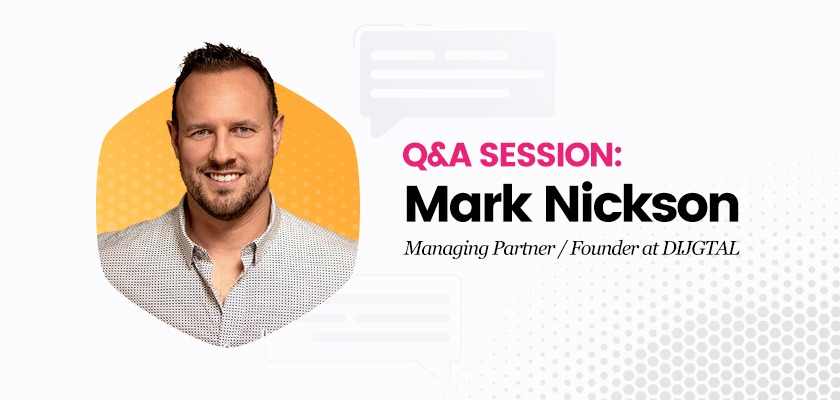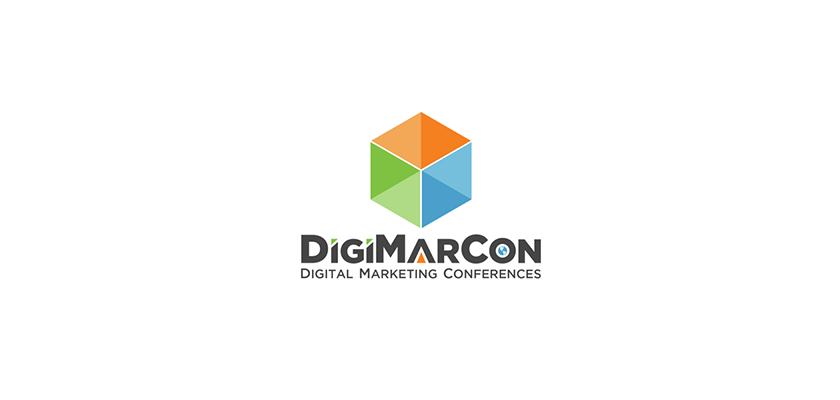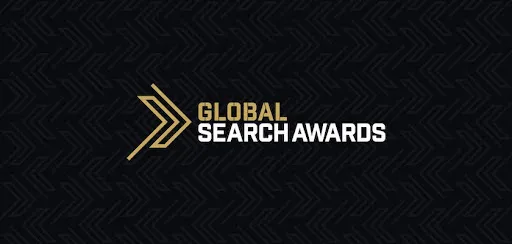
DIJGTAL Managing Partner / Founder Mark Nickson Shared His Insights Into Digital Transformation
Mark Nickson, Managing Partner & Founder at DIJGTAL has joined our Q&A session about the impacts of COVID-19 on different industries.
He shared his experience in digital during COVID-19 and his insights into what is waiting for the companies after this crisis.
Q1. Digital transformation for companies and brands has become almost mandatory in a very short time. As a digital agency, how are you handling this process? Can you please share some concrete examples elaborating your digital transformation process?
Big first question, small space to answer!
As an agency we will naturally form (or in many cases dictate) part of the process, but the core digital transformational efforts will typically be supported and managed via strong change management strategies led by our partner’s (aka client’s) internal stakeholders.
That said, what we do find is that we play an integral part in influencing and delivering on specific parts that make up the larger digital transformation efforts. In order to be effective, and provide value back to the partner, it’s important for us to first understand the basic differences between digital transformation vs. digitalisation vs. digital adoption. This is where DIJGTAL’s experience in ‘human-led’ thinking plays a crucial part, and helps senior stakeholders shift their mindset in order to implement strategies more effectively.
It could be said that digitalisation in its simplest form is the automation of business processes utilising the appropriate technology — essentially transitioning from analogue to digital. However, I’d be very surprised if many businesses still exist in a truly analogue sense. Then comes ‘digital adoption;’ and in my opinion, this is one of the biggest barriers to successful full-blown ‘transformation’.
For a brand to fully transform their business through the use of technology, and digital solutions, they need to truly adopt a forward-thinking and positive ‘digital mindset’. This can be achieved through a number of avenues, but in its most basic form it could be as simple as properly implementing digital tools and solutions, and ensuring teams are utilising them to the extent they should be (i.e. don’t just build digital tools and hope people will use them, everything needs to be positioned positively as a new way of working to support efficiencies and effectiveness).
Then comes the challenge of integrating such tools, processes, and technologies to the wider workplace, and trying to do so as seamlessly as possible. The ‘adoption’ part of the process essentially comes down to ensuring productivity and bottom-line value is achieved through the successful introduction of these new digital tools or processes. So it’ll only work if the teams using them are engaged, trained, and supported properly.

For us, ‘digital transformation’ is a fundamental shift in thinking. It’s how a business needs to change the way it operates, how it implements and uses technology, and ultimately how they empower their workforce to think and act in a digital environment.
DIJGTAL supports clients through each stage of the process as and when needed. In essence, it normally comes down to the following stages that, in our opinion, are core to building a strong path to digital transformation:
- Support stakeholders in defining a new business strategy, and in crafting a vision that meets their transformational aspirations
- Enhance (or establish) a business model that supports the new goals and objectives of the business
- Break down the current business capabilities and identify where gaps or opportunities exist
- Help develop a more robust and stable operating model (or roadmap) to support increased change and growth (i.e. products, services, training, processes, systems etc)
Obviously, the above stages will also have their own goals and strategic objectives in order to deliver value.
Q2. Can you share some precautions you have taken to continue business as usual during the COVID-19 outbreak?
For starters, there really was no business as usual for us or our partners — we all needed to adapt to this ‘new normal’. From a team perspective, it was all around communicating what we ‘knew’, and what we ‘didn’t know’ about the COVID-19 situation. We’ve been very careful not to fall into the ‘panic conversation’ cycle. So instead, we’ve tried to maintain a good balance between commercial consideration to support the business and safeguard jobs, while also being mindful of employee safety (both their mental as well as physical health). We’re conscious of how everyone is impacted personally, and how stress and uncertainty around the unknown can quickly escalate. So we’ve tried hard to keep our communications considered and transparent. After all, this was new to us as business owners, and not really something we could sufficiently plan for.
In terms of partners, and how we’ve supported them, we made the decision to dig deep and double down, knowing that their budgets and revenue streams would be impacted. We worked closely with them to plan new strategies that would help reduce spend, or redirect efforts to better help in the short term. Their landscape was in a state of flux, their customer’s behaviours, spending, and needs essentially changed overnight. We needed to find new ways of doing business for them, ways that would be achievable in the short term and still be manageable for us, but ensure we return value and safeguard their business.
To the testament of our amazing partners, who we continue to support on a daily basis, they were quick to recognise our additional assistance and acknowledged what we had done for them. So, in essence, our precautions on how to safeguard our ‘business as usual’, was to further invest in our clients.
In terms of standard ‘precautions’, working from home protocols and procedures were implemented within the first week of all the COVID madness starting to transpire. Each employee was supported in ensuring they had the appropriate hardware and remote access setup available to them. A ‘daily’ collaboration and check-in plan was devised and has been in place every day since. This helped ensure that quality communications and collaboration continued and that the team still felt connected to one another and the business as a whole.
Moving forward I think this will prompt businesses (large and small) to start thinking much more proactively about creating disaster preparedness policies.
Q3. What industries are your clients mainly focused on? How has COVID-19 affected these industries?
The reality is that pretty much every industry would have been impacted in one way or another. For us, we have such a diverse range of clients spread across many different industries and geographical locations. So we’ve certainly seen our fair share of unique industry challenges (some fairly minor, some pretty significant). We’ve also witnessed how those industries have adapted (or not) and the resilience and smarts they’ve used to help see them through this period of uncertainty and business decline.
That said, with all the negativity and issues that COVID has presented businesses, I think it’d be naive of us to not see this as an amazing opportunity to challenge our own business model and use it to generate new, smarter, more robust business strategies. As a business owner, you have to see this as just another business challenge and face it proactively rather than simply placing yourself in ‘defence mode’.
Q4. What are your insights into digital transformation within different industries? How do you think they will evolve?
DIJGTAL partners with a varied client base, so it’s important for us to understand the transformations that are happening across each unique industry. This way we can better position ourselves to support and help grow our partner’s businesses — either through dynamic marketing strategies, enhanced products and services, or just new innovative ways of ‘doing business’.
The key to successfully evolving is the acceptance that you’ve never really ‘made it’. Successes are typically achieved through clearly defined and positive milestones, but for the most part, these milestones can be a challenge to accomplish and take a lot of hard work. ‘Complacency’ however, is something that can quickly and easily penetrate your business, your approach or even your mindset. It’s also something that significantly hurts a brand, and is often only recognised once it’s too late. New technological and digital advancements will always dictate changing consumer behaviours, wants, needs and desires. So it’s absolutely vital for businesses to embrace change and use it to keep refining their business strategy and their approach.
A perfect example of how new technology is helping (or forcing) our clients to transform their business, is in the ‘healthcare and pharmaceutical’ sector. An extremely high percentage of people are now using the internet to seek health-related information and to ‘self diagnose’ before seeing a doctor. This has been further supported through disruptive and digitally innovative driven solutions such as wearable tech, IoT for drug packaging as well as electronic health checks and records to name a few.
Q5. Companies are now investing more on various digital channels. Based on your know-how in digital marketing, which sectors should focus on investing in which digital channels?
Firstly, I think any industry (or business in general) that hasn’t yet invested heavily in digital channels is in for a bucket load of pain! All sectors need to see this as key to their survival. Some industries will naturally lean on digital channels much more than others. But at some point, all will benefit significantly from having a well-considered and finely tuned digital channel strategy to support their overall business objectives.
A number of our clients operate within the ‘consumer retail’ space, which is a great example of a sector that has undergone a complete digital transformation over the past 5-10 years. The sheer availability and affordability of new technology solutions have successfully enabled the industry to adopt new approaches and help transform how consumers browse and buy. More than ever before we’re seeing how a true omnichannel strategy is blending the boundaries between the traditional retail marketplace, and that of online stores — ultimately helping to blur the lines between physical and digital worlds.
No matter what industry or potential digital/technology solution, the strategy should still be driven by a ‘customer-first’ mentality. Find out where your ideal customer ‘hangs out’ online, and invest advertising spend there. The best part about digital marketing is that everything can be tracked. Nothing is stopping a company from experimenting with different styles of ads across multiple digital channels, and figuring out what delivers the best Return On Advertising Spend (ROAS). Every sector is different, there is no one-size-fits-all approach.
It’s also important to note here that digital advertising simply isn’t enough to keep a business going. Companies must also ensure that every touchpoint in their entire digital ecosystem guides a potential customer to the next logical step on the path to conversion.
Q6. After the COVID-19 crisis, it is expected that the need for digital agencies will increase. Companies will invest in digital more than ever. In this case, why do you think they should partner with your digital agency?
This is an interesting one, and I’m not sure it’s as clear cut as that.
While I imagine we’ll see businesses hungry to get back on track and make up for any lost market share. I think it’ll be a carefully considered transition, especially for the remainder of 2020, and I see a combination of things potentially happening. If able to, some businesses will want to rehire good employees they were forced to let go of. Others may simply rely on short term contract or agency support to get them through.
So while the need for digital agencies may increase, I see this as a short term solution while businesses regain their confidence around hiring and wait to see positive uptake in their business/revenue lines. That said, it’s up to agencies to demonstrate the value they bring to the table. At DIJGTAL we don’t just provide ‘services’ (after all any agency can do that), instead, we firmly believe our ‘sweet-spot’ as such is in building out and delivering on ‘strategy’, and in finding new opportunities to evolve a brand and to future proof and grow their business.
Q7. Are there any practices that you have adjusted during COVID-19 that you would like to continue after this crisis ends? (e.g. remote working)
To be honest, we’ve made sure to turn the challenges of COVID-19 into both business and personal learning and growth opportunities.
After the first week of simply reacting to the ‘unknown’, we very quickly saw it for what it really was – an opportunity to re-evaluate how we do business. We took a step back and considered what was working well, and what wasn’t and why. Sounds simple right! The problem is that you can quickly get caught up in the day to day minutia of things and lose sight of where you need/want to be. Finding that headspace and downtime for clear thinking is rare, but it’s absolutely vital for sustained success.
COVID-19 was the perfect moment for self-reflection, self-critique and an honest look inward of how we would see ourselves through this unforeseen period, and come through it even stronger than before. These are the sort of challenges that drive us as a business, so we’re no stranger to putting ourselves outside of our comfort zone.

So what would I continue post-COVID-19? Well, we’ve certainly fine-tuned our flexible remote working procedures. We’re in a much better place knowing that when a genuine need arises, then we’ll all work professionally in the capacity needed, wherever we may need to be.
Most of all though, myself and my business partner have learned the value of ensuring we have ‘headspace’ to not just run a business, but to ‘grow’ the business!
Q8. How does being a DAN member contribute to your agency’s success?
Having a platform to help agencies market their brand is great, but add in the global element of DAN and how it helps a brand establish their international presence, I think is what’s been a real positive for us. It acts as a consolidated portal to help us position our brand based on location, presence and audience.
I also appreciate how DAN and their content writers take a proactive approach to the industry, and how they identify specific areas of expertise or opportunity to communicate and spread the word for their listed agencies. They do so in a balanced and unbiased manner which I think generates a level of trust and authenticity around the platform.
There’s so much more potential for DAN, and I’m excited to see where they’ll be in the next 12 months and how this can further help us at DIJGTAL.
About DIJGTAL
DIJGTAL is a unique breed of innovation led strategists, experience designers, growth-hackers and tech nerds, with offices in Sydney, Vancouver, and Los Angeles.




















